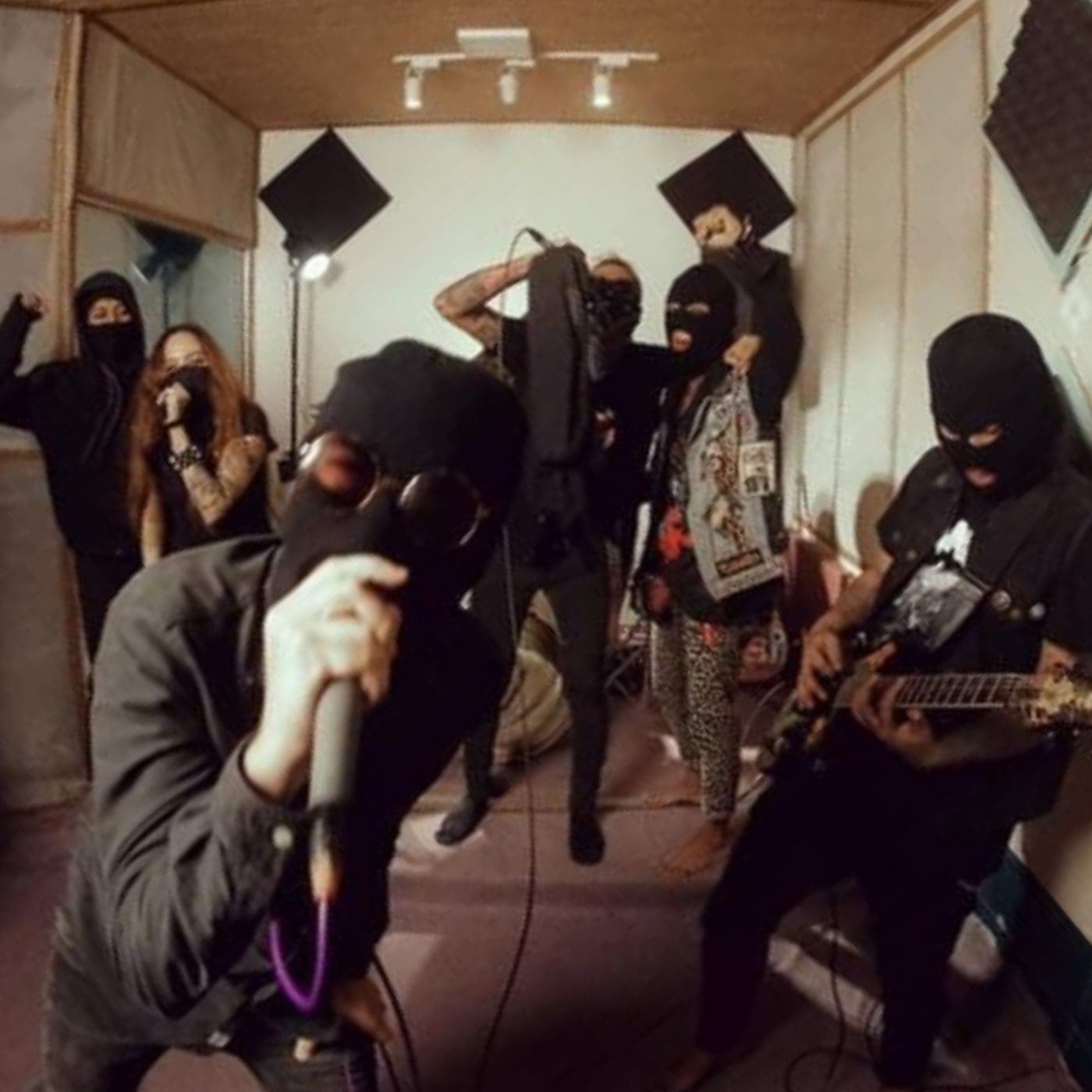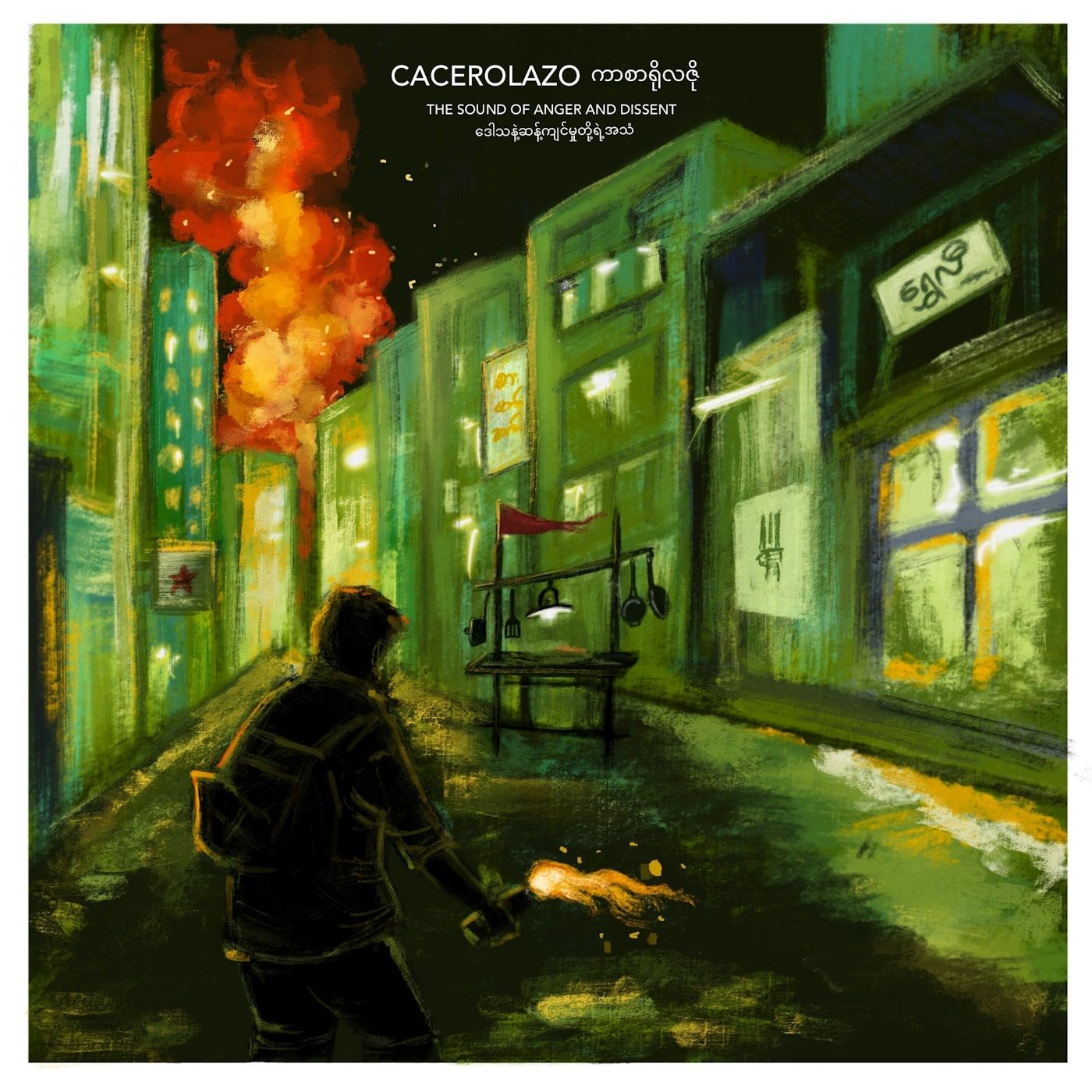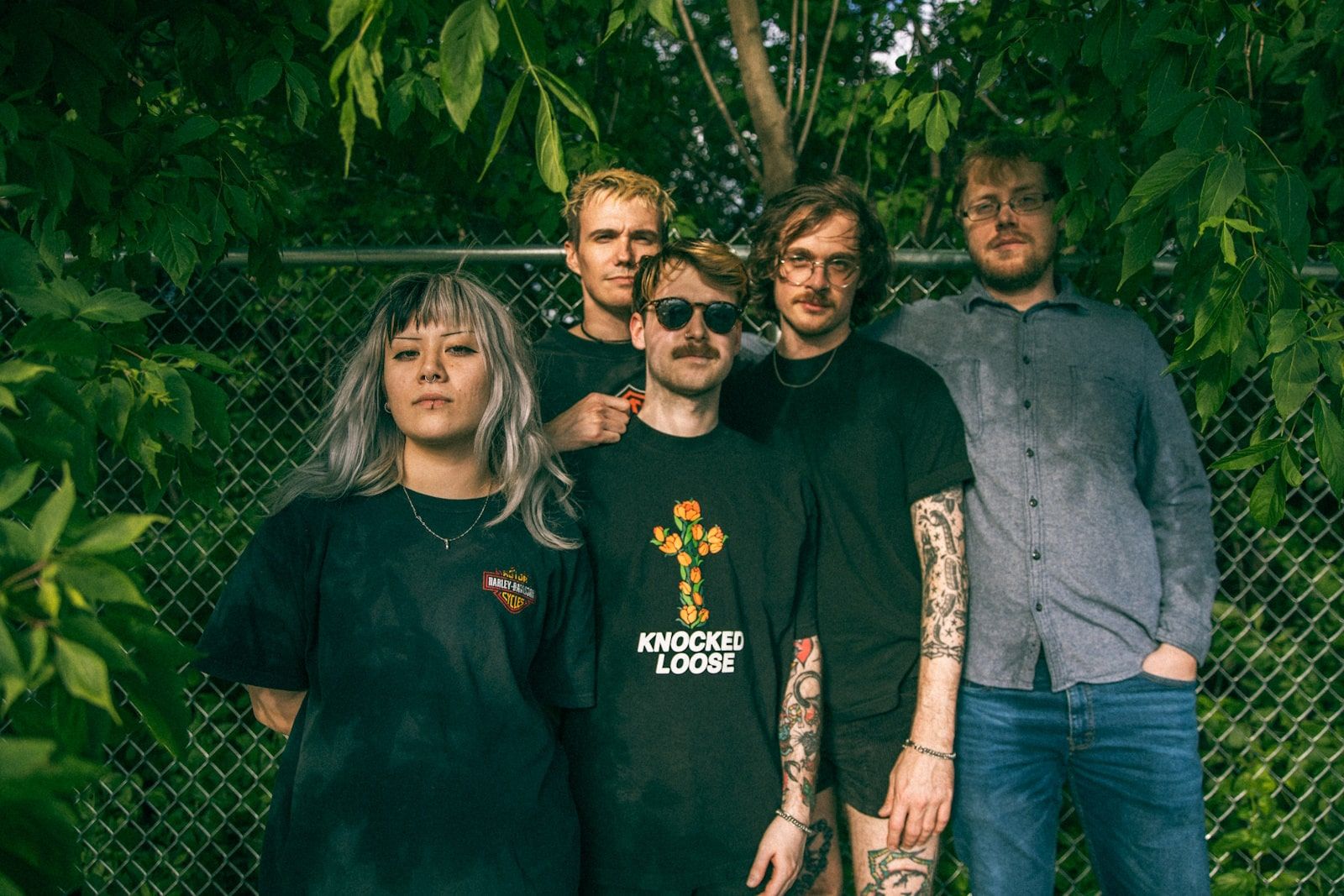When hardcore punk thrives in the midst of a political crisis, it’s a clear sign that it has been implemented in its purest and orignally intended form. Cacerolazo, a collective of Myanmar punks and international musicians, embodies this with their new album, The Sound of Anger and Dissent. Recorded under the constant threat of military repression, this nine-track release channels the defiance of a population crushed by authoritarianism.
The group formed in Yangon in the chaotic aftermath of the February 2021 military coup, which overthrew Myanmar’s democratically elected government. As protests erupted, citizens banged pots and pans at 8 p.m. nightly in a deafening expression of dissent. Cacerolazo’s name draws from this act of protest, which has deep roots in Myanmar’s cultural history and parallels with Chile’s cacerolazo demonstrations against food shortages in 1971.
Their debut track, The Night Will Not Be Silenced, became a potent anthem, blending the revolutionary 1988 Myanmar song Kabar Ma Kyay Bu with hardcore fury.
The album expands on these themes, with lyrics in Burmese and English railing against military oppression. Tracks like Disobey urge defectors within the regime to join the resistance, while The Shit You’re Selling mocks the propaganda churned out by state-controlled media. Shatter the World is a rallying cry for those who have fled urban centers to join the armed resistance in the borderlands. Musically, the band draws on classic hardcore influences like Minor Threat and Gorilla Biscuits, evident in the rapid-fire intensity of Weaponise and Sick to the Back Teeth. Slower tracks such as The Shit You’re Selling and The Sea is Rising evoke the heaviness of Melvins and Cancer Bats.
Recording the album was no small feat. With international members forced to leave the country and local musicians working under a regime that arrests dissenters, Cacerolazo managed to record these tracks between March 2021 and July 2022. The collective only performed live once, delivering a ten-minute set to a private audience in a Yangon practice space—an act of defiance staged within sight of a military bunker armed with heavy weaponry.
The stakes for Myanmar’s punk scene have never been higher. Once a tight-knit community that thrived on small shows and collaborations, the scene has been decimated by arrests, forced conscriptions, and exile. Yet, pockets of resistance remain. Cacerolazo’s music is not just a protest—it’s a lifeline for a subculture fighting for its survival. “Myanmar’s punk scene may be limping, but its spirit cannot be broken. It will find ways to persist,” the band states.
Proceeds from The Sound of Anger and Dissent are being donated to humanitarian causes in Myanmar. The album cover—a street scene from Yangon featuring a protestor—serves as a tribute to the country’s ongoing resistance.
In an exclusive interview below, Cacerolazo delves into the challenges of making music under a military regime, the evolution of Myanmar’s punk scene, and the international collaborations that have shaped their sound. Topics include the album’s themes, their unique blend of influences, and a message to the global community about Myanmar’s dire situation.
How long have you been involved in the Myanmar punk scene, and how has it evolved over the years? What are some unique characteristics of the punk scene in Myanmar, and what limitations does it face, especially under the current political climate?
For my safety and security, I don’t want to make it too personal about my involvement in the punk community. But the punk scene in Myanmar grew in the early 2000s when the country was still under the military rule of the previous regime.
People didn’t have access to the internet, so punks learned about the music through tapes smuggled into the country. It’s by no means a big scene, but it is a dedicated group of people who, before the coup in 2021, were putting on regular shows, even getting some international bands in from the region and even farther afield (Total Chaos played the Hard Rock Café in a mall in 2019 – probably the least punk thing ever).
The scene centred around the guys in Jam It! and The Rebel Riot, with the former releasing records and putting on shows by more melodic punk bands, while The Rebel Riot and their community took influence a lot from D-beat and street punk – fast and noisy. Since the coup, it’s been a lot more limited. Freedom of speech has been crushed, and this has made a lot of people more fearful of putting out music and organising shows for fear they will get arrested or the shows raided.
A lot of the kids with the means have fled the country either to escape arrest, avoid being conscripted into the Myanmar military to fight a civil war against their own people or even just to find better opportunities in a safer country.
As a result, there are fewer bands and fewer shows, but people still take some risks to put on bands every month or so, even playing subversive songs and making political statements between songs. This really is dangerous, and people have been arrested for a lot less.
We played our first and only show in late 2021 – a 15-minute set in a practice space to a private audience of maybe 30 people while 50 metres down the road sits a bunker with a heavy machine gun guarding a regime office. We were terrified all day before it, but we got away with it. The tension in Yangon has eased slightly since then, and there are gaps and cracks through which punk can exist in the current circumstances, but people have got to be careful.
Can you share the story behind the formation of Cacerolazo following the 2021 military coup? What inspired you to use music as a form of protest?
It just felt like the right thing to do. It was the only way we knew how to creatively respond to what was going on before our eyes. A democratic election – the will of the people – was torn from society’s hands and replaced with violence and the bloodshed of innocent civilians guilty of nothing but standing up for what they believe in.
We pulled together friends from the punk community, and wrote and recorded The Night Will Not Be Silenced in a matter of weeks. The last part of the song is a cover of a revolutionary anthem called Kabar Ma Kyay Bu, which is based on the Kansas song Dust in the Wind.
This song echoed around our heads day in and day out during the early days of the street protests when it was being sung everywhere. Turning it into a hardcore song felt like the right thing to do. Now that song, the original revolutionary anthem from 1988, has been effectively outlawed.
Your band name references a form of protest popularized in Chile and has roots in Myanmar’s traditions. How does this symbolism reflect in your music and message?
The cacerolazo is a protest popularised in Chile in which people bang pots and pans. In Myanmar, a similar act is done to ward away evil spirits. During the early months of the coup, everyone would be out on the streets every day banging their pots and pans at 8pm in a rally cry against the military regime. When curfew was introduced, they did it from their balconies.
Every night in Yangon, there was a deafening din. Eventually, the military started targeting people for doing it, and the risk was too big, but during the early days, it was an incredible demonstration of how thousands, even millions, of people felt across the country. Given we are a hardcore collective too, it made sense to name the band after a noisy protest – it’s basically what we are doing too.
Which other bands or artists from Myanmar or the international scene would you recommend to listeners who are interested in music with a strong message?
My favourites are The Rebel Riot, No U Turn, The Slingshot and Kultureshock.
“The Sound of Anger and Dissent” is a powerful encapsulation of the current sentiments in Myanmar. Could you delve into the themes of the album and what you hope listeners will take away from it?
The Night Will Not Be Silenced was specifically about how the 8pm pots and pans protest could not be silenced. Unfortunately, it sort of was. But the will of the people has not been silenced, and nearly four years on from the coup, people are still battling for freedom, for democracy, for a brighter future in Myanmar. Disobey is about willing defectors to join the resistance.
The Shit You’re Selling is about the state media and the nonsense it spews. Sick to the Back Teeth is just about how we are sick (to the back teeth) of the actions of the military who proclaim to love Myanmar, but are just murdering its people, destroying its towns and cities with airstrikes, and obliterating people’s futures. Shatter the World is a song of solidarity with those who have chosen to fight back for freedom and a new Myanmar.
All we hope we can do with this record is raise awareness about the situation in Myanmar with people who do not know what is happening. What is happening in the country is largely overshadowed by wars in other corners of the world. But I hope solidarity in the punk community can help people reach out to find out more and share this record and show their support. We will donate any proceeds to humanitarian causes too.
View this post on Instagram
Can you share some thoughts on the album cover?
It’s a street scene in Yangon – we wanted it to be distinctively Burmese and represent the protest movement too, hence the person in the middle.
Who are your musical inspirations, both locally and internationally, that have shaped your sound and message?
We take influence from the snappy hardcore punk of Minor Threat and Gorilla Biscuits on tracks like Weaponise and Sick to the Back Teeth, while our love for Melvins, Helmet and Cancer Bats shine through when we slow things down on The Shit You’re Selling and The Sea is Rising.
Given the risks, how do you navigate performing and sharing your music within Myanmar? What means of networking and what tools do you use to make it thrive?
It’s really hard – we have to rely on word-of-mouth and what little coverage we can get for a band that has to remain anonymous and can’t play shows.
Based on your experiences, how do you see the future of the punk scene and youth resistance movements in Myanmar?
Myanmar’s punk scene may be limping, but its spirit cannot be broken. It will find ways to persist. Eventually, it will come back stronger than ever.
You’ve covered revolutionary tracks like “Bella Ciao”. What significance does this song hold for you and the current struggle in Myanmar?
Bella Ciao is an anarchist anthem, and our friend wanted us to help him cover it hardcore style. He took a maximalist approach to get all our friends involved, so that’s why there’s an accordion, violin and god knows how many people singing. It was a lot of fun.
What message do you wish to convey to the international community through your music?
Pay attention to Myanmar. Sanction the bastards at the top. Stop the supply of military equipment. Stop the supply of jet fuel. Every day, innocent civilians are dying due to bombs dropped from planes carrying fuel imported from abroad. This has to end.
Are there any upcoming projects or collaborations we should anticipate from Cacerolazo?
Let’s see. We hope to get to work on some new tunes soon.











